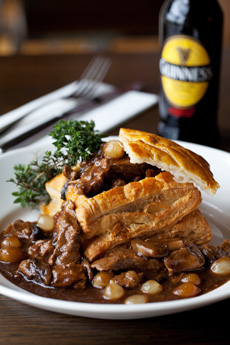ST. PATRICK’S DAY: Beef Stew With Guinness & Puff Pastry
|
An everyday beef stew can be turned into a special-occasion dish, merely with the addition of some puff pastry and wine or beer. This recipe, Beef & Guinness with Puff Pastry, was created for his St. Patrick’s Day menu by Justin O’Connor, Executive Chef at the Guinness Storehouse in Dublin. Patrick’s Day. The recipe serves four. Ingredients For 4 Servings 1. SLICE the vegetables as desired. In a pot, brown the diced beef all over. Add the vegetables and cooked for 5 minutes. Add the herbs and beef stock. Finally, add the Guinness. 2. BRING the stew to a slow boil and simmer for 1 to 1¼ hours. If needed, add a bit of water towards the end. 3. MAKE the egg wash. Beat the egg thoroughly with a fork. Add 2 tablespoons of water or milk and a pinch of salt. Stir until combined. (Milk creates a more browning on the pastry.) 4. CUT the puff pastry into 8 even pieces. Brush each piece of pastry with a pastry brush. Make four double packets by placing one piece of pastry atop another piece. Score the top of the pastry to give it the effect of a vol au vent. 5. BAKE at 390°F for 14 minutes. When cool, cut the top of to form a lid. Core some of the top out in the centre of each packet. Spoon the beef stew into each case and serve. |
|
|
|
Guinness is a brand of Irish dry stout that originated in the brewery of Arthur Guinness, at St. James’s Gate in Dublin. Arthur Guinness signed a 9,000 year lease (was there a clause for rent increases??) for an vacant brewery and began to brewing ale in 1759. Guinness was first a domestic product, but began export 10 years later. Guinness stout evolved from the porter style of beer that originated in London in the early 18th century. A distinctive feature of Guinness is the burnt flavor, which derives from roasted unmalted barley. It has a thick, creamy head, created by the “surging” of bubbles of nitrogen as the beer is poured. The brand became wildly popular, even without advertising or discounts. Guinness became a public company in 1886, with average sales of 1.2 million barrels a year. By 1914, Guinness was producing 2.6 barrels of beer a year—more than double that of its nearest competitor. In the 1930s, Guinness became the seventh largest company in the world. Guinness is brewed in approximately 50 countries and sold in more than 100. [source]. ________________ *Guinness Foreign Extra Stout was first brewed in 1801, designed for export; hence the name “Foreign.” It is more heavily hopped than Guinness Draught and Extra Stout, and typically has a higher alcohol content (7.5% ABV). The extra hops were used as a natural preservative for the long journeys the beer would take by ship. |
||


